2021年高三上学期第一次段考(英语)
2021年高三上学期第一次检测考试英语试卷含答案
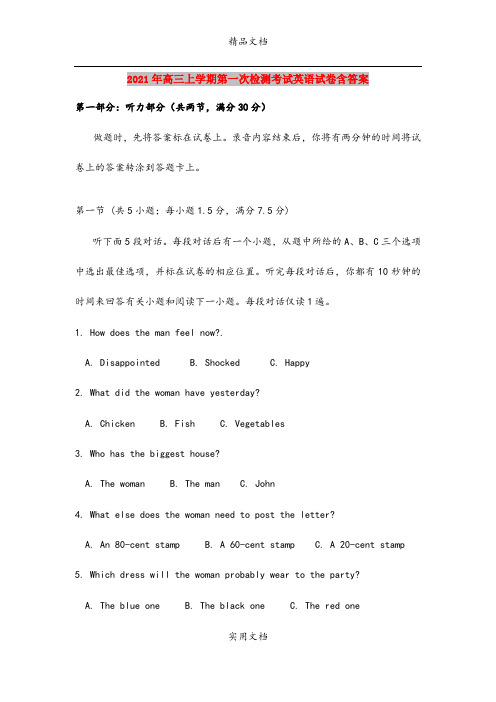
2021年高三上学期第一次检测考试英语试卷含答案第一部分:听力部分(共两节,满分30分)做题时,先将答案标在试卷上。
录音内容结束后,你将有两分钟的时间将试卷上的答案转涂到答题卡上。
第一节 (共5小题;每小题1.5分,满分7.5分)听下面5段对话。
每段对话后有一个小题,从题中所给的A、B、C三个选项中选出最佳选项,并标在试卷的相应位置。
听完每段对话后,你都有10秒钟的时间来回答有关小题和阅读下一小题。
每段对话仅读1遍。
1. How does the man feel now?.A. DisappointedB. ShockedC. Happy2. What did the woman have yesterday?A. ChickenB. FishC. Vegetables3. Who has the biggest house?A. The womanB. The manC. John4. What else does the woman need to post the letter?A. An 80-cent stampB. A 60-cent stampC. A 20-cent stamp5. Which dress will the woman probably wear to the party?A. The blue oneB. The black oneC. The red one第二节(共15小题;每小题1.5分,满分22.5分)听下面5段对话或独白。
每段对话或独白后有几个小题,从题中所给的A、B、C三个选项中选出最佳选项,并标在试卷的相应位置。
听每段对话或独白前,你将有时间阅读各个小题,每小题5秒钟;听完后,各小题给出5秒钟的作答时间。
每段对话或独白读2遍。
听第6段材料,回答第6~7小题。
6. What does the man worry about?A. Getting H1 N1 flu.B. Having a high temperature.C. Catching a cold.7. How often should the man take his medicine?A. Four times a day.B. Four times a week.C. Six times a day.听第7段材料,回答第8~10小题。
2021年高三上学期第一次阶段考英语试题 含答案

第一部分听力(共两节,满分30分)做题时,先将答案标在试卷上。
录音内容结束后,你将有两分钟的时间将试卷上的答案转涂到答题卡上。
第一节(共5小题:每小题1.5分,满分7.5分)听下面5段对话。
每段对话后有一个小题,从题中所给的A、B、C三个选项中选出最佳选项,并标在试卷的相应位置。
听完每段对话后,你都有10秒钟的时间来回答有关小题和阅读下一小题。
每段对话仅读一遍。
1.Where does the conversation probably take place?A. In a shopping mall.B. In a tie shop.C. In a theatre.2. What will the woman do?A. Give Joan a call.B. Tell Joan about the meeting.C. Have lunch with the man.3. What do we know about the woman`?A. She wants to know John Hart.B. She called the wrong number.C. She couldn’t find John Hart.4. What does the man mean?A. He isn’t good at painting.B. The woman has a talent for art.C. He doesn’t like those painting.实用文档5. Who is Cindy?A. The man’s wife.B. The man’s cousin.C. The man’s friend.第二节(共15小题;每题1.5分,满分22.5分)听下面5段对话或独白。
每段对话或独白后有几个小题,从题中所给的A,B,C 三个选项中选出最佳选项,并标在试卷的相应位置。
听每段对话或独白前,你将有时间阅读各个小题,每小题5秒钟;听完后,每小题将给出5秒钟的作答时间。
2021年高三上学期第一次考试英语试题

2021年高三上学期第一次考试英语试题第一部分单项选择(每小题1分,共15分)1. What______ pity that you couldn’t be there to receive______ prize!A. a; aB. the; aC. a; theD. the; the2. The pretty girl is known______ the public______ a film star _____her great performance in a film.A. in; as; withB. to ; as; forC. among; with; inD. by; for; because3. A lot of measures have been taken to protect wildlife in the country. _____, many wild animals are still endangered.A. ThereforeB. AdditionallyC. butD. However4. ---John went to the hospital alone.--- If he _____me about it, I would have gone with him.A. should tellB. tellsC. toldD. had told5. ---Ann is in hospital.--- Oh, really? I_____ know, I______ go and visit her.A. didn’t; am going toB. don’t; wouldC. don’t; willD. didn’t; will6. Mothers holding jobs outside the home should have ______schedules to make it easier to care for their children.A. heavyB. smoothC. flexibleD. plex7. Try your best to help the people when they are in trouble, _______you will feel pleased and happy.A. unlessB. orC. andD. but8. Considering his health , his teacher _____him to retire ahead of time.A. suggestsB. advisesC. insistsD. hopes9. My suggestion is that we _____to finish our homework.A. tryB. will tryC. must tryD. can try10. Helping others is a habit,______ you can learn even at an early age.A. itB. thatC. whatD. one11. The teacher together with the students______ discussing Reading Skillsthat_____ newly published.A. are; wereB. is; wereC. are; wasD. is; was12. I have told you the truth. ______ I keep repeating it?A. MustB. CanC. MayD. Will13.The lady walked around the shops,_______ an eye out for bargains.A. keepB. keptC. keeping D to keep14. The newly-built café, the walls of ______ are painted light green, is really apeaceful place for us, especially after hard work.A. thatB. itC. whichD. what15. — Jenny, I've learned your plan. Could I make some suggestions?— _______ .A. My pleasureB. Go right aheadC. With pleasureD. Just for fun 第二部分:完形填空: (每小题1.5分,共30分)I was said to be the worst student in my class, and my family thought I was hopeless. I had to 16 grade VI, and at that time a new teacher, Miss Sadia, came to our school.One day after class, she 17 that I was staying alone during the lunch break. She came to me and began to talk to me. It was just a 18 conversation. After that day, she gave me particular 19 and it made me feel special. I started to work hard because she gave me the feeling that 20 believed me , and my 21 started to improve in her subject.Months later, she moved into a house near my 22 . We would walk home together after school. Her constant support helped me, 23 in my studies, as I knew she would 24 my grades both in her subject and the other subjects. I finally 25 second in my class.Then, after grade six, she started to slowly drift away(疏远)26 still kept aconstant check on me. By the time I was in grade seven, we 27 spoke, but by then I had bee the 28 in my class. When I left my school, I was 29 with her, as she never answered the 30 when I called her.Then I graduated and went to a good university. One fine day, our paths 31 again. I met her at a wedding. I could not 32 asking her, "Why did you stop talking to me?""You are a clever boy. I wanted you to be a tree 33 on your own roots, not depending on others. Now here you are and I feel 34 of you. You are your inspiration and do not need to 35 a shoulder." she said. I could not say anything, but I smiled. I'll always thank her for what she has done for me.16. A. jump B. attend C. copy D. repeat17. A. heard B. noticed C. learned D. sensed18. A. stupid B. useless C. normal D. secret19. A. attention B. attraction C. explanation D. examination20. A. everyone B. someone C.anyone D. nobody21. A. words B. objects C. classes D. grades22. A. home B. school C. hotel D. pany23. A. generally B. actually C. especially D. usually24. A. change B. look C. improve D. check25. A. received B. came C. caught D. held26. A. but B. as C. or D. so27. A. ever B. often C. once D. hardly28. A.oldest B. strongest C , best D cleverest29. A. out of touch B. in mon C. out of reach D. in touch30. A. road B. schoolyard C. phone D. machine31. A. separated B. formed C. added D. crossed32. A. finish B. help C. prevent D. keep33. A. standing B. flying C. growing D. sitting34. A. sad B. proud C. good D. ashamed35. A. give up B. get on C. look for D. take up第三部分:阅读理解(共两节,满分40分)第一节(共15小题;每小题2分,共30分)AThis is a true story from Guyana. One day, a boy took a piece of paper from a box. He made a paper ball and pushed it into his nose. He couldn’t get it out. He ran crying to his mother. His mother couldn’t get the paper out, either. A week later, the paper was still in the boy’s nose. His nose began to have a bad smell.So his mother took the boy to a hospital. The doctor looked up at the child’s nose, but she couldn’t get the paper out. She said she had to cut the boy’s nose to get the paper out.The boy’s mother came home looking sad. She didn’t want her child to have his nose cut. The next day she took the boy to her friend Sidney who lived in a house with an old lady called May. May wanted to see the child, so the child let her look up his nose.“Yes, I can see it,” May said. “It will be out soon.”As she spoke, she shook some black pepper (胡椒粉)on the child’s nose. The child gave a mighty sneeze and the paper flew out. His mother was surprised. May told his mother to take the boy to the seaside for a swim, for the salt water would go up his nose and stop the bad smell.So the lucky boy didn’t have to go to the hospital to have his nose cut.36. After the boy pushed a paper ball into his nose, ____.A. he took it outB. his mother took it outC. he did nothing but cryD. he tried to take it out but failed37. Which of the following is TRUE?A. The doctor helped to take the paper ball out of the boy’s nose.B. May succeeded in taking the paper out.C. The boy’s moth er found some black pepper to solve the problem.D. The boy had to have his nose cut at last.38. The boy should be taken to the seaside for a swim because ____.A. he needed to learn to swimB. the sea water would stop the bad smell of his nose.C. the sea water would wash out the paper ball.D. he needed a restBIn the United States, when one bees rich, he wants people to know it. And even if he does not bee very rich, he wants people to think that he is. That is what “keeping up with the Joneses” is about. It is the story of someone who tried to look as rich as his neighbours.The expression was first used in 1913 by a young American called Arthur Momand. He told this story about himself. He began earning $ 125 a week at the age of 23. That was a lot of money in those days. He got married and moved with his wife to a very wealthy neighbourhood outside New York City. When he saw that rich people rode horses, Momand went horseback riding every day. When he saw that rich people had servants, Momand and his wife also hired a servant and gave big parties for their new neighbours.It was like a race, but one could never finish his race because one was always trying to keep up. The race ended for Momand and his wife when they could no longer pay for their new way of life. They moved back to an apartment in New York City.Momand looked around him and noticed that many people do things just to keep up with rich lifestyle of their neighbours. He saw the funny side of it and started to write a series of short stories. He called it “Keeping up with the Joneses” because “Jones” is a very mon name in the United States. “Keeping up with the Joneses”came to mean keeping up with rich lifestyle of the people around you. Momand’s series appeared in different newspapers across the country for over 28 years.People never seem to get tired of keeping up with the Joneses. And there are “Jonses” in every city of the world. But one must get tired of trying to keep up with the Joneses because no matter what one does, Mr. Jones always seems tobe ahead.39. Some people want to keep up with the Joneses because they ____________.A. want to be as rich as their neighboursB. want others to know or to think that they are richC. don’t want others to know they are richD. want to be happy40. It can be inferred from the story that rich people like to ____________.A. live outside New York CityB. live in New York cityC. live in apartmentsD. have many neighbours41. Arthur Momand used the name “Jones” in his series of short stories because “Jones” is ____________.A. an important nameB. a popular name in the United StatesC. his neighbour’s nameD. not a good name42. According to the writer, it is ____________ to keep up with the Joneses.A. correctB. interestingC. impossibleD. goodCDuring the twentieth century there has been a great change in the lives of women. A woman marrying at the end of the nineteenth century would probably have seven or eight children, of whom four or five lived till they were five years old and up. By the time the youngest was fifteen, the mother would have been in her early fifties and would expect to live a further twenty years, during which chance and health made it unusual for her to get paid work. Today women marry younger and have fewer children. Usually a woman’s youngest child will be fifteen when she is forty-five and can be expected to live another thirty-five years and is likely to take paid work until sixty.This important change in women’s life has only recently begun to have its full effect on women economic (经济的) position. Even a few years ago most girls left school and took a full-time job. However, when they married their school-leaving age is sixteen. Many girls stay at school after that age, and though women marry younger, more married women stay at work at least until shortly before their first child is born. Very many more afterwards return to fuller part-time work. Such changes have led to a new relationship in marriage (婚姻), with the husband accepting a greater share of the duties and satisfactions of family life.43. We are told that in a family about 1900________.A、few children died before they were fiveB、seven or eight children lived to be more than fiveC、the youngest child would be fifteenD、four or five children died when they were five44. One reason why the woman of today may take a job is that she______.A、is younger when her children are old enough to look after themselvesB、does not like children herselfC、needn’t worry about food for her childrenD、can be free from family duties when she reaches sixty45. Many girls are now likely to_______.A、give up their jobs for good after they are marriedB、leave school as soon as they canC、marry so that they can get a jobD、continue working until they are going to have a baby46. According to the passage, it is now quite usual for women to _______.A、stay at home after leaving schoolB、marry men younger than themselvesC、start working again in lifeD、marry while still at schoolDDo you forget to turn off the lights and heaters when you go out of a room? In 2040 it will not matter. They will turn themselves off—and on again when you return. You will choose the temperature for each room, the lighting and the humidity. A sensor(传感器) will find the presence of a human (and, with luck, ignore the dog!) and turn the systems on, and when the humans leave it will turn them off again.The sensors will work through the central home puter, and they will do much more than just turn the fires and lights on and off for you. They will find faulty electrical appliances, plugs or switches, separate them so that they cannot harm anyone, and then warn you that they need repair. They will detect(发现) fire and if you are out of the house, the puter will call the fire brigade. It will not be too difficult because the locks on the outside doors will be electronic. You will open them using your personal card—the one you use for shopping—maybe using a number known only to you.It will be impossible to lose the key, and a housebreaker will have to tamper(拨弄) with the lock or with a window. It is not very difficult to make such tampering send a signal to the puter.The puter will be more than a fireman-policeman-servant. It will be an entertainer, and most of your entertainment will e right into your home. It does now, of course, but by 2040 “entertainment”will mean much more. For one thing, you will be able to take part actively, rather than just watching.47. The author intends to tell us that _____.A. in 2040 we will live without lights and heatersB. in 2040 we will use much more lights and heatersC. in 2040 there will be no switches of lights and heatersD. in 2040 lights and heaters will be on and off automatically48. According to the author, in 2040, new technology _____.A. will free us from the keys we use todayB. will turn everything into sensorsC. will make the locks out of dateD. will get rid of all crimes49. Thanks to puters, in 2040 people _____.A. will have no entertainment outsideB. will replace TV with putersC. will be controlled by putersD. will have more fun at home50. The best title for the passage might be _____.A. Sensors and putersB. Life at Home in the Year 2040C. The Development of Science and TechnologyD. Lights and Heaters in the Year 2040第二节(共5小题;每小题2分,满分10分)根据短文内容,从短文后的选项中选出能填入空白处的最佳选项。
2021年高三上学期第一次阶段考试英语试题 含解析
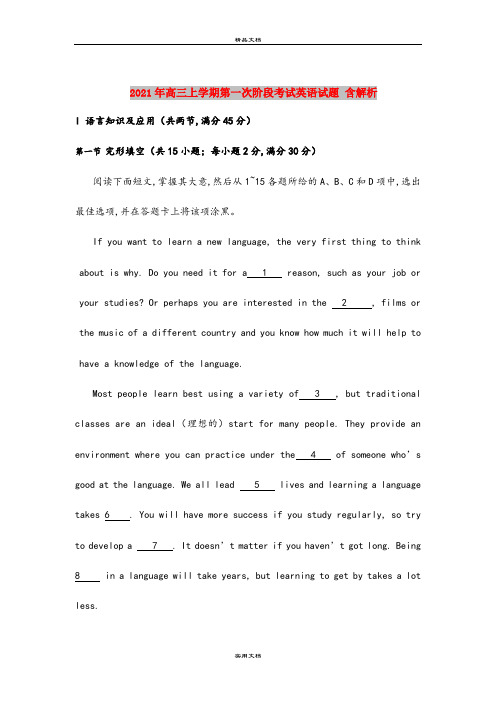
2021年高三上学期第一次阶段考试英语试题含解析I 语言知识及应用(共两节,满分45分)第一节完形填空(共15小题;每小题2分,满分30分)阅读下面短文,掌握其大意,然后从1~15各题所给的A、B、C和D项中,选出最佳选项,并在答题卡上将该项涂黑。
If you want to learn a new language, the very first thing to think about is why. Do you need it for a 1 reason, such as your job or your studies? Or perhaps you are interested in the 2 , films or the music of a different country and you know how much it will help to have a knowledge of the language.Most people learn best using a variety of 3 , but traditional classes are an ideal(理想的)start for many people. They provide an environment where you can practice under the 4 of someone who’s good at the language. We all lead 5 lives and learning a language takes 6 . You will have more success if you study regularly, so try to develop a 7 . It doesn’t matter if you haven’t got long. Being 8 in a language will take years, but learning to get by takes a lot less.Many people start learning a language and soon give up. “I’m too9 ,” they say. Yes, children do learn languages more 10 thanadults, but research has shown that you can learn a language at any11 . And learning is good for the health of your brain, too. I’ve alsoheard people 12 about the mistakes they make when 13 . Well,relax and laugh about your mistakes and you’re much less likely to makethem again.Learning a new language is never 14 . But with some work and devotion, you’ll make progress. And you’ll be 15 by the positivereaction of some people when you say just a few words in their own language.Good luck!【文章大意】这篇短文主要谈论了成年人学习外语的一个话题。
2021年高三上学期第一次统一考试英语试题 含答案
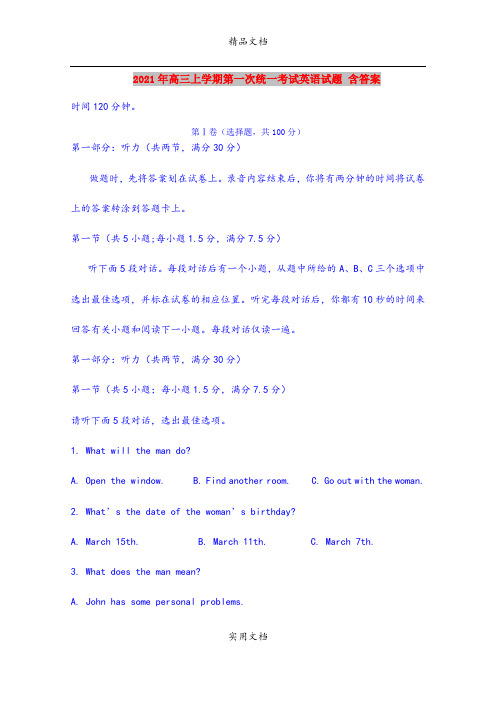
2021年高三上学期第一次统一考试英语试题含答案时间120分钟。
第Ⅰ卷(选择题,共100分)第一部分:听力(共两节,满分30分)做题时,先将答案划在试卷上。
录音内容结束后,你将有两分钟的时间将试卷上的答案转涂到答题卡上。
第一节(共5小题;每小题1.5分,满分7.5分)听下面5段对话。
每段对话后有一个小题,从题中所给的A、B、C三个选项中选出最佳选项,并标在试卷的相应位置。
听完每段对话后,你都有10秒的时间来回答有关小题和阅读下一小题。
每段对话仅读一遍。
第一部分:听力(共两节,满分30分)第一节(共5小题;每小题1.5分,满分7.5分)请听下面5段对话,选出最佳选项。
1. What will the man do?A. Open the window.B. Find another room.C. Go out with the woman.2. What’s the date of the woman’s birthday?A. March 15th.B. March 11th.C. March 7th.3. What does the man mean?A. John has some personal problems.B. The problem is mon for young men.C. It’s not mon for young men to leave home.4. What will the man most probably do?A. Get some change from Jane.B. Go and look for a payphone.C. Use Jane’s mobile phone.5. What does the man mean?A. It was impossible for him to go to the party.B. Everybody was surprised by his appearance at the party.C. He had expected to go to the party for a long time.第二节(共15小题;每小题1.5分,满分22.5分)请听下面5段对话或独白,选出最佳选项。
2021年高三英语上学期第一次段考试试卷
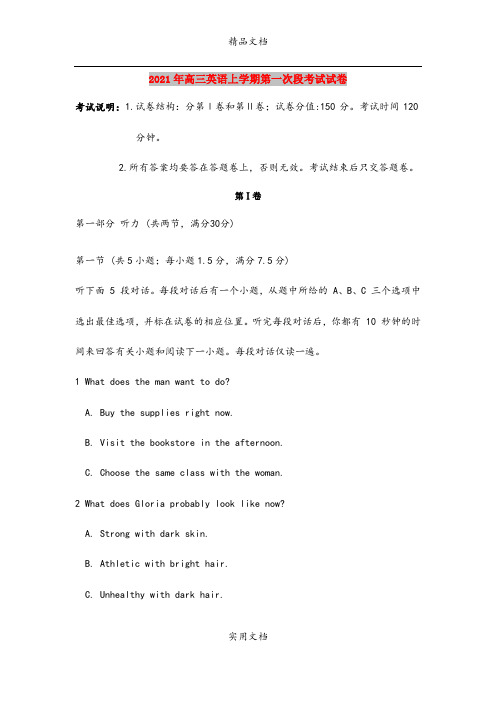
2021年高三英语上学期第一次段考试试卷考试说明:1.试卷结构:分第Ⅰ卷和第Ⅱ卷;试卷分值:150分。
考试时间120分钟。
2.所有答案均要答在答题卷上,否则无效。
考试结束后只交答题卷。
第Ⅰ卷第一部分听力 (共两节,满分30分)第一节 (共5小题;每小题1.5分,满分7.5分)听下面 5 段对话。
每段对话后有一个小题,从题中所给的 A、B、C 三个选项中选出最佳选项,并标在试卷的相应位置。
听完每段对话后,你都有 10 秒钟的时间来回答有关小题和阅读下一小题。
每段对话仅读一遍。
1 What does the man want to do?A. Buy the supplies right now.B. Visit the bookstore in the afternoon.C. Choose the same class with the woman.2 What does Gloria probably look like now?A. Strong with dark skin.B. Athletic with bright hair.C. Unhealthy with dark hair.3 What does the woman mean?A. The man will soon have time to practise.B. The man shouldn’t give the performance.C. The vacation will be put off.4 What will the man do tomorrow?A. Go to a concert.B. Attend a party.C. Meet Janet.5 Which postcard will the woman send to her sister?A. The city postcard.B. The lake postcard.C. The forest postcard.第二节听下面 5 段对话或独白。
2021年高三上学期第一次阶段性测试英语试题

2021年高三上学期第一次阶段性测试英语试题本试卷分选择题和非选择题两部分。
共120分。
考试用时120分钟。
第一部分听力(共两节,满分20分)做题时,先将答案标在试卷上。
录音内容结束后,你将有两分钟的时间将试卷上的答案转涂到答题卡上。
第一节听下面5段对话。
每段对话后有一个小题,从题中所给的A、B、C三个选项中选出最佳选项,并标在试卷的相应位置。
听完每段对话后,你都有10秒钟的时间来回答有关小题和阅读下一小题。
每段对话仅读一遍。
1 Where is the post office?A. Opposite a supermarketB. In front of a hotel.C. Next to a garage.2 How did the woman feel about her life?A. Worried.B. Bored.C. Satisfied3 What present did the woman get from her parents?A. Shoes.B. JeansC. A bag4 What did the man do at the weekend?A. He went sailing.B. He rode horses.C. He walked in thewoods5 What are the speakers discussing?A. A job.B. An interviewee.C. A manager第二节听下面 5 段对话或独白。
每段对话或独白后有几个小题,从题中所给的 A、B、C 三个选项中选出最佳选项,并标在试卷的相应位置。
听每段对话或独白前,你将有时间阅读各个小题,每小题 5 秒钟;听完后,各小题将给出 5 秒钟的作答时间。
每段对话或独白读两遍。
听第 6 段材料,回答第 6、7 题。
6 Where does the conversation take place?A. At a travel agency.B. At a hotel.C. At an airport7 What day is it today?A. Tuesday.B. Wednesday.C. Thursday.听第 7 段材料,回答第 8、9 题。
2021年高三上学期第一阶段考试英语试题 含答案
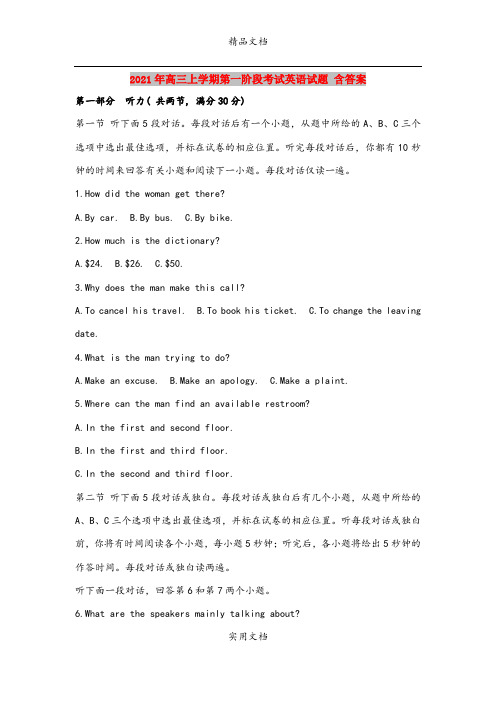
2021年高三上学期第一阶段考试英语试题含答案第一部分听力( 共两节, 满分30分)第一节听下面5段对话。
每段对话后有一个小题,从题中所给的A、B、C三个选项中选出最佳选项,并标在试卷的相应位置。
听完每段对话后,你都有10秒钟的时间来回答有关小题和阅读下一小题。
每段对话仅读一遍。
1.How did the woman get there?A.By car.B.By bus.C.By bike.2.How much is the dictionary?A.$24.B.$26.C.$50.3.Why does the man make this call?A.To cancel his travel.B.To book his ticket.C.To change the leaving date.4.What is the man trying to do?A.Make an excuse.B.Make an apology.C.Make a plaint.5.Where can the man find an available restroom?A.In the first and second floor.B.In the first and third floor.C.In the second and third floor.第二节听下面5段对话或独白。
每段对话或独白后有几个小题,从题中所给的A、B、C三个选项中选出最佳选项,并标在试卷的相应位置。
听每段对话或独白前,你将有时间阅读各个小题,每小题5秒钟;听完后,各小题将给出5秒钟的作答时间。
每段对话或独白读两遍。
听下面一段对话,回答第6和第7两个小题。
6.What are the speakers mainly talking about?A.Life styles.B.Happy childhood.C.Activities in spare time.7.What does the woman think of taking photos?A.It's interesting.B.It's a waste of money.C.It's suitable for children.听下面一段对话,回答第8和第9两个小题。
- 1、下载文档前请自行甄别文档内容的完整性,平台不提供额外的编辑、内容补充、找答案等附加服务。
- 2、"仅部分预览"的文档,不可在线预览部分如存在完整性等问题,可反馈申请退款(可完整预览的文档不适用该条件!)。
- 3、如文档侵犯您的权益,请联系客服反馈,我们会尽快为您处理(人工客服工作时间:9:00-18:30)。
2021年高三上学期第一次段考(英语)第一部分:听力(共两节,满分30分)第一节(共5小题;每小题l.5分,满分7.5分)听下面5段对话。
每段对话后有一小题,从题中所给的A、B、C三个选项中选出最佳选项,并标在试卷相应位置。
听完每段对话后,你都有10秒钟的时间回答有关小题和阅读下一小题。
每段对话仅读一遍。
( ) 1. What will the couple do soon probably?A. Go to change some clothes.B. Write an essay together.C. Eat out together.( ) 2. Where are the two speakers probably now?A. In a restaurant.B. At a garage.C. In a hospital. ( ) 3. Why didn’t the woman drive her car?A. Her car broken down.B. The gas ran out.C. Her car was lent.( ) 4. Wha t’s the probable relationship between the speakers?A. Colleagues.B. Good friends.C. Boyfriend and girlfriend.( ) 5. What’s the man’s decision?A. Repairing the typewriter.B. Buying a new typewriter.C. Thinking about repairing.第二节(共15小题;每小题l.5分,满分22.5分)听下面5段对话或独白。
每段对话或独白后有几个小题,从题中所给的A、B、C三个选项中选出最佳选项,并标在试卷的相应位置。
听完每段对话或独白后,你将有时间阅读各个小题。
每小题5秒钟;听完后,每小题将给出5秒钟的作答时间。
每段对话或独白读两遍。
听第6段材料,回答第6至7题。
( ) 6. How long has Helen been collecting pencils?A. For two years.B. For three years.C. For six years.( ) 7. What is on Helen’s favorite pencil?A. Some words.B. Some letters.C. Some pictures.听第9段材料,回答第13至16题。
( ) 13. Why does the man talk to the woman?A. He wants to join a club.B. He wants to take part in a party.C. He is taking an examination to learn music.( ) 14. What kind of instrument can the man play?A. The piano and drum.B. The piano and violin.C. The drum and trumpet.( ) 15. What must the man do?A. Sing and play.B. Play or dance.C. Sing, play or dance. ( ) 16. What can we learn about the man from the conversation?A. He likes disc.B. He has a lot of CDs.C. He will pay for joining.听第10段材料,回答第17至20题。
( ) 17. How do they arrive in Middletown?A. By air.B. By train.C. By taxi.( ) 18. What should the passengers do when they get off the plane?A. Walk straight ahead.B. Turn to the left to Terminal B.C. Walk to their right to get their baggage.( ) 19. Which place will the baggage arrive?A. At CarouselB. B. At the blue area.C. Near the green sign.( ) 20. Where can the passengers find airport transportation?A. At the departure gate.B. Under the green sign.C. At Carousel B.第二部分:英语知识运用(共两节,满分45分)第一节:语法和词汇知识(共l5小题;每小题l分,满分l5分( ) 21. —I wonder how much you charge for your services.—The first two are free the third one costs 30 dollars.A. whileB. untilC. beforeD. when( ) 22. Nuclear science should be developed to benefit the future generations harm them.A. other thanB. more thanC. better thanD. rather than ( ) 23. —Does it often rain here in summer?—Hardly ever. , the climate is like that of a desert.A. What’s moreB. In realityC. HoweverD. Still( ) 24. The project by the end of xx will expan d the city’s telephone network greatly.A. being acplishedB. acplishedC. to be acplishedD. having been acplished( ) 25. I’d appreciate if you would like to teach me how to use the puter.A. thatB. itC. thisD. you( ) 26. The firm was taken by Lenovo Group Limited a couple of days ago.A. overB. inC. awayD. into( ) 27. —My son failed to be accepted by the pany after the interview.—Now that he wasn’t well prepared, he might as well .A. not tryB. not to have triedC. not have triedD. not to try ( ) 28. The Somali pirates’ frequent attacks on the Sea urged the United Nations to all nations to take immediate action.A. fight forB. apply forC. call onD. wait on ( ) 29. The child lost his way in the forest, where he was of the elements.A. in chargeB. at the mercyC. in the possessionD. on the edge( ) 30. It is not immediately clear the financial crisis will soon be over.A. sinceB. whatC. whenD. whether ( ) 31. You are saying that everyone should be equal, and this is I disagree.A. whyB. whereC. whatD. how( ) 32. NBA made policy of zero in the match several years ago.A. toleranceB. allowanceC. agreementD. permission ( ) 33. not all government officials are honest.A. It seems to me thatB. It remains some doubt thatC. There seems to be thatD. There remains some doubt that ( ) 34. In the United States, there is always flow of people to areas of country where more jobs can be found.A. a; theB. the; aC. the; theD. a; a( ) 35. Conservation efforts focused largely on those plants and animals that already had declined to the point they were endangered.A. whichB. thatC. whereD. when第二节完形填空(共20小题; 每小题1分,满分20分)阅读下面短文,掌握其大意,然后从所给的A、B、C、D四个选项中,选出最佳选项,并在答题卡上将该项涂黑。
When I was in my first year of college. I felt hopeless and alone. I felt everything in my life was a 36 .One day, I was walking from class across the campus to catch my bus home, head down, fighting 37 of total despair (绝望). When a man came down the sidewalk toward me. I had never seen him before. 38 at being seen in such an emotional mess, I turned my head away and 39 to hurry past. I 40 he had left, but he moved on until he was 41 in front of me, waited until I looked up, and then 42 .I stood there without saying a ward, tears still in my eyes. 43 my eyes, this stranger spoke in a 44 voice, “No matter what happ ens in your life, all the trouble will 45 . Don’t give up your hope. You’re sure going to be 46 , just hang on.” He, then, turned over and walked away.I can’t explain the huge 47 of that moment, of that man’s e48 kindness and unconditional c aring! He gave me the one thing I’d lost 49 : hope. I looked for him on campus, to thank him, but 50 saw him again.That was thirty years ago. And I haven’t 51 that moment till now. over the years, whenever I see people in 52 , I think of that kind man and try to 53 them some help wherever I can —carrying groceries for people, taking care of crying babies in airport lounges54 the mother wants to get herself some food or a washroom, talking to 55 couples at the checkout line to mak e the moment energetic …If you keep your head up, your heart will show you the place that needs a small hope. ( ) 36. challenge B. disaster C. danger D. matter ( ) 37. A. tears B. fears C. sweat D. feelings ( ) 38. Disappointed B. Surprised C. Embarrassed D. Excited ( ) 39. A. happened B. failed C. forced D. hoped( ) 40. A. indicated B. thought C. realized D. observed ( ) 41. A. helpfully B. angrily C. incidentally D. directly ( ) 42. A. smiled B. scolded C. asked D. replied ( ) 43. A. Glancing at B. Looking into C. Checking over D. Turning to ( ) 44. A. strange B. mysterious C. terrible D. kind( ) 45. A. end B. remove C. hide D. decrease ( ) 46. A. hard B. safe C. kind D. fine( ) 47. A. confusion B. effect C. curiosity D. effort( ) 48. A. uncountable B. unfamiliar C. unexpected D. unprepared ( ) 49. A. pletely B. quickly C. purposely D. frequently( ) 50. A. still B. never C. even D. seldom ( ) 51. A. abandoned B. shared C. lost D. forgotten ( ) 52. A. panic B. emergency C. trouble D. guide( ) 53. A. afford B. offer C. lend D. pay( ) 54. A. while B. unless C. so D. until( ) 55. A. confused B. insprired C. tired D. relaxed第三部分:阅读理解(共20小题;每小题2分,满分40分)阅读下列短文,从每题所给的A、B、C和D项中,选出最佳选项,并在答题卡上将该项涂黑。
